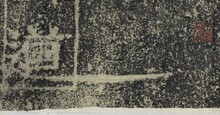This talk is taken from a conceptual history project that examines the different roles that “Dao” – usually translated as “Way” – has played in political and philosophical arguments across multiple discourses and genres in the formative centuries of the Han period. It starts by summarizing the way its connotations develop in the Western Han period, culminating in the famous taxonomy of the Records of the Archivist (Shiji) produced by the Simas at the end of the first century BCE. Then it turns to how, in the Eastern Han, “Dao” is increasingly used to distinguish “correct” (zheng) methods and practices from excessive or incorrect ones. My argument is that to really understand the differences between the early Han “Essays on the Dao” 道論 and the Way of the Celestial Masters 天師道 three centuries later, it is misleading to simply gesture at a distinction between “philosophical” and “religious” Daoism. We must also realize that the term “Dao” was being used in fundamentally different ways.
Mark Csikszentmihalyi uses both excavated and transmitted texts to reconstruct the culture and thought of early China. He holds the Eliaser Chair of International Studies, and serves as Chair of Berkeley’s Department of East Asian Languages and Cultures and as Director of the Graduate Group in the Study of Religion. He is also the editor of the journal Early China. His most recent book was co-edited with Michael Nylan, and is the 2022 Technical Arts in the Han Histories.
